Vasily Smyslov - The Truth Teller
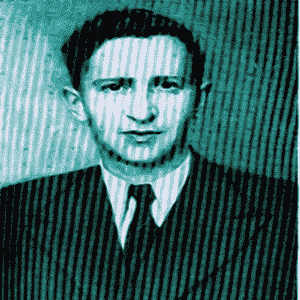
Vasily Smyslov
His father, also Vasily, was a student of Mikhail Chigorin and once beat Alexander Alekhine in a tournament game. Smyslov Snr was young Vasily's first chess coach. His father's coaching must have had some effect because the second Smyslov went on to achieve many great things.
He reached the Candidate's Tournament on 8 occasions. He played in 3 World Championships, all against Mikhail Botvinnik. He won the middle one of these. He shared 1 USSR Championship and enjoyed some outright victories in smaller city tournaments. He won a record 17 Chess Olympiad medals.
Smyslov looked for the best move in every position. He was quite successful in this endeavor. When the games of all the most famous Grandmasters are measured for accuracy, Smyslov tops the table with the highest percentage of strongest moves found.
Young Vasily
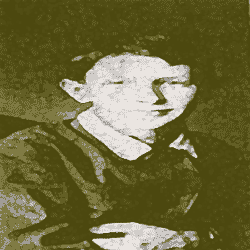
Young Vasily Smyslov
The father began to train the son from the age of 6. He gave him a copy of My Best Games of Chess 1908 - 1923 by Alexander Alekhine as study material. This book became the foundation of Vasily's chess philosophy. He later described it as his constant reference. Indeed Smyslov Snr had a whole library of chess books that his son would eventually read in it's entirety.
Smyslov Jnr began to play competitively from the age of 14, winning the USSR Junior Championship in 1938 at the age of 17. He then moved into senior competitions tying for 12th spot at the Leningrad–Moscow International tournament of 1939.
War Years in USSR

Vasily Smyslov gained strength during the war years
Chess like many other activities had come to a shuddering halt across Europe as the war raged on. It was different in the USSR where many events were still organized. These tournaments had very strong all-Soviet fields.
Smyslov finished 3rd in the 1940 USSR Chess Championship and 3rd again at the 1941 Absolute Championship of the USSR. He was up against Botvinnik, Keres, Boleslavsky, Bondarevsky and Lilienthal. This creditable result really marked him out as a serious player.
Smyslov finished 2nd at Kuibyshev 1942. He then captured the 1942 Moscow Championship and continued to get good results up to the mid-40s, most notably sharing 3rd at Sverdlovsk 1943. He did go through a dip from 45-48 and many people questioned his inclusion in the 1948 World Championship because of this.
World Championship League
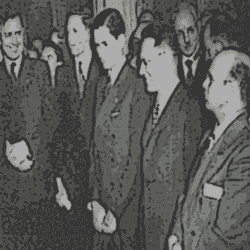
1948 World Championship League - Left to Right: Euwe, Smyslov, Keres, Botvinnik, Reshevsky
At the end of it all, Botvinnik finished in top spot (14/20), followed by Smyslov (11/20), then Keres and Reshevsky both (10.5/20) and finally the ex-Champion Euwe (4/20).
There were suggestions that Soviet officials leaned on Keres somewhat. Some would say that he may have been advised that Botvinnik should not be blocked in his attempt to be World Champion.
Apparently Botvinnik himself heard of such conversations and objected vigorously. Paul Keres lost four of his five games against Botvinnik. How much influence the advice had is impossible to say. Either ways second spot was a creditable result for Smyslov which silenced his detractors. It also qualified him automatically for the Candidate's Tournament the next time round.
Candidate Years
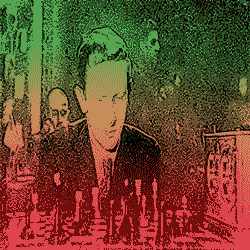
Vasily Smyslov won the Candidates Tournament in Zurich
Smyslov did okay finishing in 3rd, 2 points behind joint winners Bronstein and Boleslavsky. They went to a playoff and Bronstein beat Boleslavsky. But he did not enjoy the same success later in the World Championship. He drew with Botvinnik. This meant Botvinnik would remain as champion.
Smyslov's third place meanwhile qualified him to play in the 1953 Candidates Tournament in Zurich. Competing in a field of 15, he came out on top this time. He finished 2 points ahead of Bronstein, Keres and Reshevsky.
Challenging Times
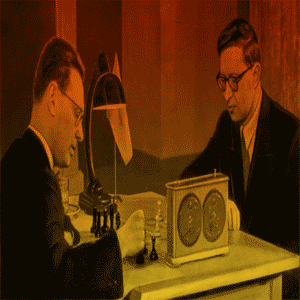
Vasily Smyslov challenged Mikhail Botvinnik in 1954
Bronstein had led the last time very late into the match. Botvinnik had shown resolve to fight back and avoid defeat. He would not simply hand Smyslov the title. He would have to fight every last step of the way to rip it away.
Smyslov got off to a nightmarish start finding himself 3 behind after 4 games. Then he rallied to bring it back to 3-3. It went blow for blow for a few games until Botvinnik led by 2 with just a few games remaining. Smyslov equalized again with one game left to play. As challenger Smyslov had to win it. But he couldn't and Botvinnik clung to his title on a score of 7-7 (10 draws).
Smyslov the Champion
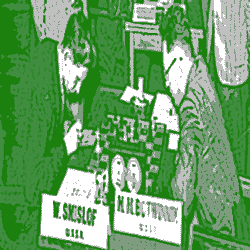
Vasily Smyslov won the World Championship in 1957
He was 3 years older now and the extra experience would all be needed. He also had a strong team to help him on analysis. Azerbaijani IM Vladimir Makogonov and Russian GM Vladimir Simagin were on board.
Together they masterminded the key to Botvinnik's defeat. Vasily Smyslov won the World Championship on a score of 6-3 (13 draws).
Botvinnik Strikes Back
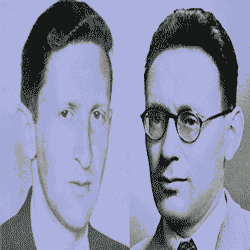
Mikhail Botvinnik regained the World Championship from Vasily Smyslov in 1958
Botvinnik was energized by his defeat. Instead of folding and drifting away, he went into serious training. He got himself into good physical shape and worked tirelessly on his game. He activated his right to a rematch the following year.
The rematch did not go as the previous encounter had. Botvinnik reversed the result winning back his title in fine style. Smyslov cited poor health in the match as a contributory factor. He conceded however that Botvinnik had played to a high standard and was the worthy winner.
Later Career
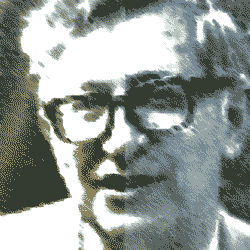
Vasily Smyslov remained successful long after the loss of his world title
He had a wonderful record in his native Moscow. He won championships there on several occasions throughout the 1960s. He was a winner at Mar del Plata, Argentina in 1966. He took 1st place in Amsterdam, Holland in 1971. He won in Sao Paulo, Brazil in 1978.
These victories are just a few honors among many. Smyslov also had countless high place finishes in the 80s and 90s. His rating remained above 2500 well into his golden years. He even shared 1st place in Buenos Aires, Argentina in 1990 and took 2nd in Malmo, Sweden in 1997 aged 76!
Legacy of Smyslov
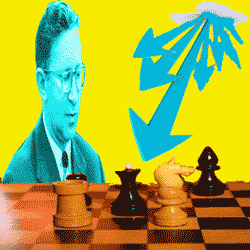
Vasily Smyslov leaves a legacy of free-flowing harmony
His autobiography is titled A Sense of Harmony. He explains what he means by this when speaking on the work he did in those early days with his father:
"He instilled in me a love for so-called 'simple' positions, with the participation of only a few pieces, I was able to gain a deep feeling for what each piece is capable of, to sense their peculiarities, their strength and impotence in various different situations on the board, the limits of their capabilities, what they 'like' and what they 'don't like' and how they behave.
Such a 'mutual understanding' with the pieces enables a player to see that which often remains concealed to purely logical analysis. It is then that the innate ability of a player, which I call a sense of harmony, manifests itself."
Moving On
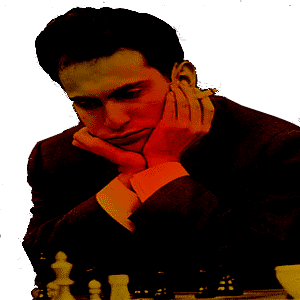
Mikhail Tal
Everyone knew that when they were up against Smyslov they could not afford to make even small mistakes. His game was naturally suited to take a microscopic advantage early on and progressively build on it move by move. 20 moves later Smyslov would have a clear advantage and his opponent would be scratching his head wondering where he went wrong.
Smyslov was one of two players to briefly interrupt Botvinnik's reign as World Champion. The second Winter King to borrow the title from Botvinnik could not have been more different from Smyslov in terms of playing style. His name was Mikhail Tal.






